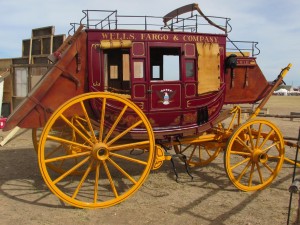
Passengers riding in coaches such as this one were crammed inside, tolerated bumpy, muddy or dusty roads. If there was too much baggage on the top, mails were often left behind for a week or more.
In the 1850s there was one newspaper serving Northeast Texas. For several years it was known as the Northern Standard, but when tensions grew in the region over the probability of civil war, the owner of the newspaper changed it to The Standard so there would be no confusion about his stand on things. Charles DeMorse who lived and worked in Clarksville owned the paper.
By this time mail service was part of the Federal government. The Post Office Department were responsible for charting routes, setting timetables, and hiring carriers. The Texas State Gazette in Austin took up the issue in March 1855. It was the most prominent newspaper in the state and vented on the issue at length.
It seems that the Federal government intended to cut funds in Texas by using the old routes of the Republic. Texas had grown substantially in those ten years; roads that were once almost pathways now were called thoroughfares. Here in northeast Texas mail was often held up in Arkansas when the number of passengers filled the coach leaving no room for mailbags. Sometimes mail lay over for a week. It was no better for the route from Clarksville to Greenville by way of Tarrant and Black Jack Grove. The eastbound mail from Cooke County stalled for several days at Sherman.
The Texas State Gazette urged a complete overhaul of the system. One suggestion was to project the routes upon a basis referring at once to the present state of our country, and then, instead of an unwieldy, misshapen mass, Texas would have system, and with it, they might have regularity and dispatch. The mail problem was not only evident in Northeast Texas, but throughout the entire state.
Unfortunately the matter took time to remodel. By the time plans were in place, Texas had seceded from the Union, as had ten other states. It would take five years of war and up to ten more years to reinstitute the nation.
In addition to the statewide confusion, disparaging words showed a long era of mistrust between Editor DeMorse and M. T. Thayer postmaster at Greenville. Thayer appeared to be a long-winded whiner and tattletale. He seemed to always have an excuse, whether valid or not.
By 1861 a plan was presented, but with several caveats. The Civil War ceased the U. S. Post Office Department from handling the mail. During the war, the Confederate government could not afford a reliable postal department. By 1863 when the Union Army controlled the Mississippi River, areas to the west were isolated. Very little news reached Texas.
For more than a decade mail service in Texas was extremely chaotic. By 1870 railroads began to cover the state. It was the railroads and new routes and a need for better service that changed matters.
